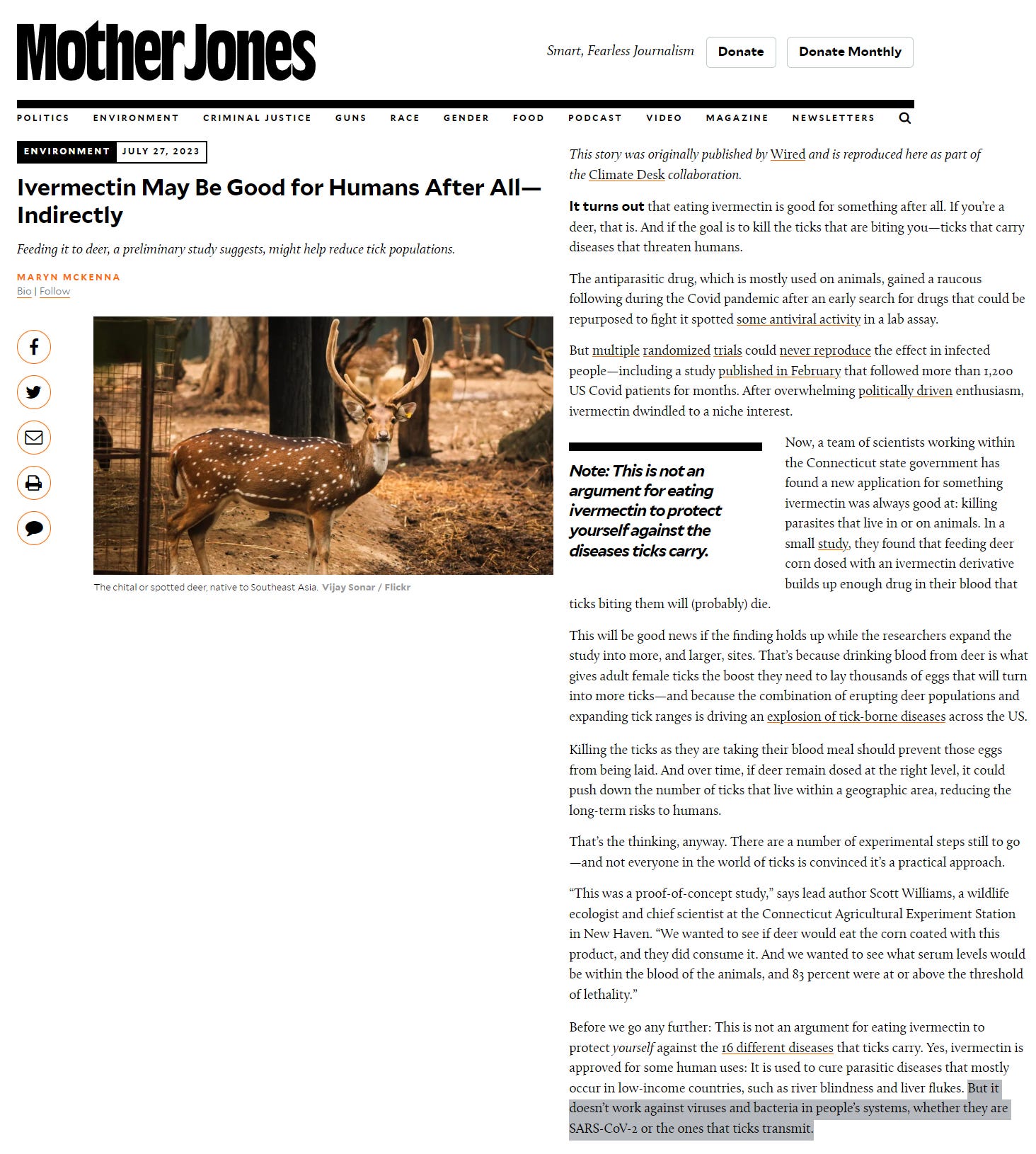Ivermectin and Lyme Disease – Testimonial and Research

I received a fascinating testimonial in my inbox today:
.
.
.
.
.
.
.

2021 Wong et al – A Review of Post-treatment Lyme Disease Syndrome and Chronic Lyme Disease for the Practicing Immunologist
- Lyme disease is an infection caused by Borrelia burgdorferi, which is transmitted to humans through the bite of an infected Ixodes tick.
- majority of patients recover without complications with antibiotic therapy.
- However, for a minority of patients, accompanying non-specific symptoms can persist for months following completion of therapy.
- The constellation of symptoms such as fatigue, cognitive dysfunction, and musculoskeletal pain that persist beyond 6 months and are associated with disability have been termed post-treatment Lyme disease syndrome (PTLDS), a subset of a broader term “Chronic Lyme disease.”
- Chronic Lyme disease is a broad, vaguely defined term that is used to describe patients with non-specific symptoms that are attributed to a presumed persistent Borrelia burgdorferi infection in patients who may or may not have evidence of either previous or current Lyme disease.
Ivermectin to Control Ticks
2000 – Attempt to Control Ticks (Acari: Ixodidae) on Deer on an Isolated Island Using Ivermectin-Treated Corn
1996 – Systemic Treatment of White-tailed Deer with Ivermectin-Medicated Bait To Control Free-Living Populations of Lone Star Ticks (Acari: Ixodidae)
1989 – Control of Lone Star Ticks (Acari: Ixodidae) on Spanish Goats and White-tailed Deer with Orally Administered Ivermectin
2023 Propaganda Article Praises Ivermectin Use in “Deer” for “Tick Control”
This is a heavy piece of propaganda, the intent of which was to ridicule people who use Ivermectin.

My Take…
I couldn’t find any research about Chronic Lyme Disease and Ivermectin.
Nevertheless, many people are using either Ivermectin or Fenbendazole to treat Chronic Lyme Disease, and they talk about it on Twitter.
A 2018 study found persistent infection despite antibiotic therapy in patients with ongoing symptoms of Lyme.
- In 2013 the Centers for Disease Control and Prevention (CDC) announced that Lyme disease is much more common than previously thought, with over 300,000 new cases diagnosed each year in the United States.
- That makes Lyme disease six times more common than HIV/AIDS, 20 times more common than hepatitis C virus infection and 30 times more common than tuberculosis in the United States.
- “Our findings address a major controversy over persistent symptoms in Lyme disease,” said Marianne Middelveen, lead author of the published study. “The results suggest that infection with the Lyme spirochete may persist in some patients despite supposedly adequate antibiotic therapy.”
Effect of Ivermectin
So is the anecdotal case I received an anti-bacterial effect, anti-inflammatory effect or something else?
There is something called “Lyme arthritis.”
From 2021 Lochhead et al – Lyme arthritis: linking infection, inflammation and autoimmunity:
“The central feature of post-infectious Lyme arthritis is an excessive, dysregulated pro-inflammatory immune response during the infection phase that persists into the post-infectious period. This response is characterized by high amounts of IFNγ and inadequate amounts of the anti-inflammatory cytokine IL-10. The consequences of this dysregulated pro-inflammatory response in the synovium include impaired tissue repair, vascular damage, autoimmune and cytotoxic processes, and fibroblast proliferation and fibrosis. These synovial characteristics are similar to those in other chronic inflammatory arthritides, including rheumatoid arthritis”
Ivermectin and Rheumatoid Arthritis
2023 Khan et al – Evaluation of therapeutic potential of ivermectin against complete Freund’s adjuvant-induced arthritis in rats: Involvement of inflammatory mediators
- Thirty-two male Wistar rats were randomly divided into four groups: control, diseased, dexamethasone, and ivermectin groups
- After 7 days of rheumatoid arthritis induction, animals were treated with dexamethasone 5 mg/kg and ivermectin 6 mg/kg
- Treatment with ivermectin showed a significant reduction in inflammatory cells levels, body weight, and visual arthritic score, indicating an improvement in the degree of inflammation as compared with the diseased group.
- Ivermectin treatment also showed a significant reduction in the severity of inflammation and destruction of joints and showed comparable effects to dexamethasone, a corticosteroid used for the treatment of rheumatoid arthritis
-
Conclusion: “Ivermectin has significant antiarthritic properties and can be a novel treatment agent for the management of rheumatoid arthritis patients”
Conclusion
Ivermectin, is comparable to a strong steroid like dexamethasone (6 times stronger than prednisone) in reducing severity of inflammation and destruction of joints in Rheumatoid Arthritis. That’s impressive.
That’s it’s helping those who suffered from 25 years of Lyme disease, joints and muscle pains is also impressive.
Lyme sufferers should definitely look into Ivermectin.
Maybe there’s more to Ivermectin, Lyme Disease and COVID-19.
*
Click the share button below to email/forward this article to your friends and colleagues. Follow us on Instagram and Twitter and subscribe to our Telegram Channel. Feel free to repost and share widely Global Research articles.
Spread the Truth, Refer a Friend to Global Research
Dr. William Makis is a Canadian physician with expertise in Radiology, Oncology and Immunology. Governor General’s Medal, University of Toronto Scholar. Author of 100+ peer-reviewed medical publications.
Featured image is from the Public Domain

